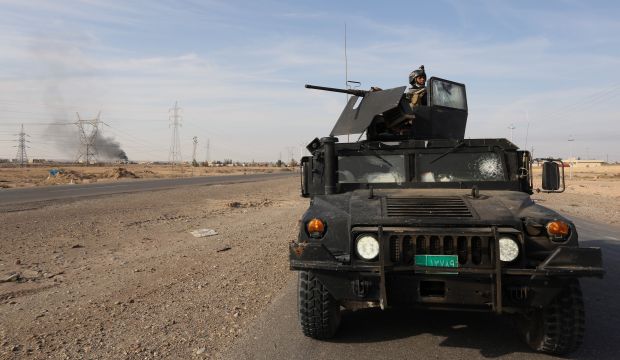
Iraqi security forces are deployed during a military operation to regain control of the villages around the town of Baiji, north of Baghdad, Iraq, on December 8, 2014. (AP Photo/Hadi Mizban)
The retaking of Baiji—which lies 25 miles (40 kilometers) north of Tikrit and is home to the country’s largest oil refinery—was hailed as a major success by Baghdad and the first sign of a reversal of fortunes for the beleaguered Iraqi army, which collapsed in spectacular fashion in June as ISIS swept across large swaths of northern Iraq, overrunning Baiji in the process.
Shaalan Karim, an MP from the Salah Al-Din province where Baiji is situated, told Asharq Al-Awsat the town could fall into ISIS’s hands once again if “swift measures” were not taken to arm military and tribal volunteer forces currently protecting the town, adding that the extremist group was “reality much better equipped” than these forces.
Karim said the main reason for the resurgence in ISIS’s presence in the area was due to “a lack of an adequate plan on the ground” on the part of government forces to keep control of the town and its environs.
“This therefore necessitates either sending more Iraqi army units to the area . . . or arming the local volunteer tribal groups, because they alone are capable of protecting the area,” he added.
He said many of the tribal volunteer groups who had come to Baiji to fight alongside the Iraqi army had come from distant towns and that “most of them” had gone home following the retaking of the city from ISIS in November.
“Many of these volunteer fighters rely on their own efforts to secure weapons, and many of them came [to Baiji] without weapons at all,” he said. “The government has not armed any of these groups in the province even until now.”
Reports had earlier suggested ISIS had returned to the area following a retreat by government and volunteer forces during a recent Shi’ite religious festival in the town.
A member of the Salah Al-Din provincial council said there were currently street battles raging in the areas surrounding the town, with some districts frequently changing hands between forces belonging to ISIS and those from army and volunteer units that had remained.
In addition, a number of villages surrounding the town still remained under the control of the extremist group, he added.
